Sophie Nélisse and Geoffrey Rush The Book Thief
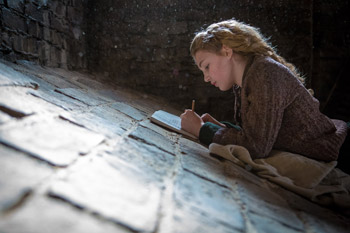
Sophie Nélisse and Geoffrey Rush The Book Thief
Cast: Sophie Nélisse, Geoffrey Rush, Emily Watson
Director: Brian Percival
Genre: Drama, War
Synopsis: Based on the beloved bestselling novel, The Book Thief tells the inspiring story of a spirited and courageous young girl named Liesel, who transforms the lives of everyone around her when she is sent to live with a foster family in World War II Germany.
For Liesel, the power of words and of imagination becomes a means of escape – and even joy – from the tumultuous events enveloping her and everyone she knows and loves. She is The Book Thief's heart and soul.
Indeed, it is heart and soul – as well as triumph and perseverance"that drive the film, which is rich in themes and characters that will resonate for every generation. A moving and poignant portrait of the resiliency of the human spirit, this life-affirming tale contrasts innocence (as embodied by Liesel) with the pervasive tyranny that marked the times and her homeland.
The Book Thief
Release Date: January 9th, 2014
About the Production
Beginnings
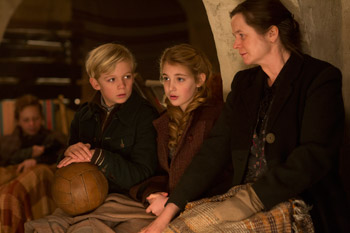 The story and its characters sprang from the imagination of author Markus Zusak whose novel The Book Thief was published in his native Australia in 2005 and throughout the rest of the world in 2006. The book has sold eight million copies worldwide, held a place on The New York Times best-seller list for almost seven years and has been translated into over 30 languages. Additionally, it has won over a dozen literary awards, held the number-one position at Amazon.com, and appeared on numerous best-of-the-year lists.
The story and its characters sprang from the imagination of author Markus Zusak whose novel The Book Thief was published in his native Australia in 2005 and throughout the rest of the world in 2006. The book has sold eight million copies worldwide, held a place on The New York Times best-seller list for almost seven years and has been translated into over 30 languages. Additionally, it has won over a dozen literary awards, held the number-one position at Amazon.com, and appeared on numerous best-of-the-year lists.
Markus Zusak's book and director Brian Percival's (Downton Abbey) film adaptation tell the story of Liesel (Sophie Nélisse), who is sent to live with foster parents, the kind-hearted Hans Hubermann (Geoffrey Rush) and his prickly wife Rosa (Emily Watson). Reeling from the tragic death of her younger brother only days before and timid around the new 'parents" she's just met, Liesel struggles to fit in – at home and at school, where her classmates taunt her as 'dummkopf" due to her inability to read.
With the single-minded obsession of a budding scholar, Liesel is determined to change that. And she gets help. Her empathetic 'Papa," Hans works day and night with Liesel as she pores over her first tome, The Gravedigger's Handbook, which she walked off with following her brother's funeral – an impulsive act of thievery that will have profound consequences for the young heroine.
Liesel's love for reading and her growing appreciation for her new family are heightened when she befriends a new guest in the Hubermann's home – a Jewish refugee named Max (Ben Schnetzer), who shares her passion for books and encourages Liesel to expand her powers of observation, even as he hides from the Nazis in a dark and dank basement. Equally transformative is her burgeoning friendship with a young neighbor, Rudy (Nico Liersch), who teases Liesel about her book thievery even as he finds himself falling in love with her.
These friendships, along with her exponentially growing love of books provide both an escape and a pathway to shaping Liesel's destiny. She comes to appreciate not only the power of words, but a power beyond words.
Author Markus Zusak says he was inspired to write the book by stories told to him by his parents when he was a young boy in Australia. 'It was like a piece of Europe came into our kitchen when my mom and dad told tales about growing up in Germany and Austria, the bombings of Munich, and about the prisoners the Nazis marched through the streets," says the author. 'I didn't realise it at the time but those stories led me to want to become a writer.
'It was a time of extreme danger and evil and I was inspired by the acts of kindness during these very dark times," Markus Zusak continues. 'That's what The Book Thief is about: finding beauty in even the ugliest of circumstances. One of the central themes of the story is that Hitler is destroying people with his words, and Liesel is stealing back the words, and she's writing her own story with them."
The novel's scope and its triumphant young heroine drew the attention of producers Karen Rosenfelt and Ken Blancato, who since its publication have worked to bring it the big screen. 'I couldn't put the book down," says Karen Rosenfelt. 'It was so life affirming. I was struck by how Markus brought Liesel to life, and by her fortitude, strength, abilities and hunger to read and understand the power of words."
During the rise of the Nazi Party, freedom of expression was severely curtailed. Books were being burned. 'The German people were being told what to feel, what to think, and what to read," says Karen Rosenfelt. 'In spite of these seemingly insurmountable obstacles, Liesel, by learning to read, is empowered to be creative, think on her own, and not parrot the ideas of others."
A big step forward in the film's development was the hiring of screenwriter Michael Petroni (The Chronicles of Narnia: Voyage of the Dawn Treader) to adapt Markus Zusak's 580-page tome. When he was approached to write the screenplay, Michael Petroni was already, he says, 'a great fan of the novel."
'Markus Zusak has a prodigious talent," Michael Petroni continues. 'He has written a book that will be remembered as a classic. So, in adapting it to the screen, I first had to overcome my intimidation. The greatest challenge was choosing what to eliminate. It is a virtual treasure trove of wonderfully touching scenes, which is what drew me to the material in the first place."
There were several other challenges to be met. Michael Petroni adds: 'The book is written out of chronological order, with the narrator often intriguing the reader with tidbits of information that later play back into the story. My first job was to unravel it chronologically and then restructure scenes to have the most dramatic impact for a movie. This meant having to sometimes alter the chronology of the book; I doubt people will notice but these kinds of changes are always tricky to accomplish. I'm honoured that Markus Zusak trusted me with his book."
Michael Petroni says what resonated most with him, apart from the story's inventiveness, was that The Book Thief is a testament to endurance. 'It speaks to the strength of spirit in the human condition which every individual can relate to and be inspired by. And of course, it is about the power of words. What writer can resist that?"
As Michael Petroni continued to fine-tune the screenplay, the search for a director began. 'Based on Brian Percival's extraordinary work in British television and his passion for this project, we were very eager to meet with him," says Elizabeth Gabler, president of Fox 2000 Pictures. 'Brian Percival came to the meeting with a book he had created, consisting of imagery that depicted his vision for the film, and we were elated to have found the perfect director."
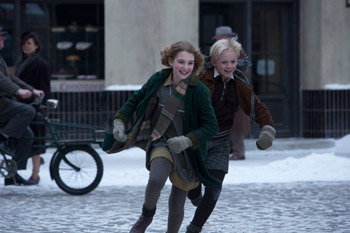 Markus Zusak had the opportunity to meet with Brian Percival early in the process, and immediately sparked to the filmmaker. 'After our meeting, as we said our goodbyes, Brian Percival pulled me a bit closer and said: -I'm not going to let you down,'" remembers the author. 'And I loved the integrity of that moment and how genuine Brian Percival was."
Markus Zusak had the opportunity to meet with Brian Percival early in the process, and immediately sparked to the filmmaker. 'After our meeting, as we said our goodbyes, Brian Percival pulled me a bit closer and said: -I'm not going to let you down,'" remembers the author. 'And I loved the integrity of that moment and how genuine Brian Percival was." With Downton Abbey's global success, Brian Percival was a much sought after director. 'At one point there were five scripts a day coming in and it was impossible to read them all," he says, 'so I would read the first 30 pages of each script and I'd know if it was a project of interest." Brian Percival says he was just a few pages into The Book Thief when he knew he had to make the film. 'I was so moved by the novel. It is such a positive, uplifting story, and I loved that the central character was a young lady who, though she has nothing and seemingly no future when we meet her, could not only survive but thrive."
Moreover, Brian Percival personally connected to the story. 'I come from quite a poor background. We started out with very little, and the desire was always to try and achieve something, which, in my case, was to make films. Later when I went to art school I remember how people taught me to look, particularly through books, at the world in a different way and so consequently live life in a different way. I related to Liesel in these ways."
Brian Percival also embraced the idea that power of words can both destroy and heal, depending on how we use them. It's a theme that runs through the story. 'Liesel begins to understand words and their power, and she realises that you can use words for good as well as for evil," he explains. 'This allows her to change her life and make choices that she would not have had before she picked up a book. That's the key to her spirit."
The Search For Liesel
Brian Percival continues: 'We needed somebody who one moment you want to put your arms around and try to protect from the difficult world she's living in, but at the same time you can expect a kick in the groin for doing it. A really ballsy kid but at the same time really vulnerable. We had to find somebody who could convey Liesel's incredible spirit. It's that spirit that makes her endure and even flourish."
All in all it was a pretty tall order for a child actor, who, in addition, would have to be able to age on screen from 11 to 17.
The filmmakers saw almost a thousand candidates for the role. Markus Zusak himself had a casting idea that proved impressively on target. He had attended a showing of a Canadian motion picture Monsieur Lazhar, which was nominated for an Academy Award® for foreign language film, and its young star won a Genie Award for Best Supporting Actress. That acclaimed actress was Sophie Nélisse, whose indelible performance earned her many new fans, including the author of The Book Thief.
'Sophie Nelisse's work in the film was amazing," says Markus Zusak, 'and as I walked out the cinema I thought she'd be great as Liesel. That was the first and only time I've assumed the mantle of a casting director, and I contacted the filmmakers and said, -I've seen this girl…' – but of course they had already planned to meet her!"
While Sophie Nelisse had yet to formally do a screen test, Karen Rosenfelt remembers that, 'I think in our hearts we all knew she was Liesel as soon as we watched her tape."
A potential obstacle to Sophie Nelisse taking on the role presented itself via another of her passions. A gifted athlete as well as thespian, she had started doing gymnastics at age three. By age six she was training 16 hours a week, and at 12, she was putting in as much as 30 hours a week. Sophie Nelisse had achieved national prominence and had her eye on the Rio Olympics, when she got the call from her agent to test for The Book Thief.
At first, Sophie Nelisse was reluctant to pursue the role because her heart was set on competing in Rio, but when an injury threatened to shatter her Olympics dream she read the script, fell in love with the character, and was excited about meeting the filmmakers in Los Angeles.
Putting her boundless energy and focus into preparing for the screen test, Sophie Nelisse says, 'I screamed like crazy when my agent called to say I was going to play Liesel. I was so happy because I like the story so much. Even though it is set during wartime, the darkness is made bright by the nice things people do for each other. Liesel survives the challenges because of her will, and because she learns to read she has control over her life and how she thinks. The story makes you see things in a different way."
Having spent so many years training in competitive gymnastics, Sophie Nelisse immediately understood Liesel's commitment and dedication to learning how to read: 'Reading is Liesel's life. When she's with her books she manages to forget all the difficulties in her life. Reading allows Liesel's imagination to blossom and helps her lead a better life."
From the moment Sophie Nelisse tested, she won the admiration of hearts of her new family of filmmakers. 'I've never come across a child with that much raw talent, instinct and an awareness of everyone's emotions around her. I find it amazing that a 13 year old can actually know that much," says Brian Percival. Adds Karen Rosenfelt: 'What I responded to in Sophie Nelisse's performance, and where Brian Percival took her, is that it's just so credible and real. When Sophie Nelisse, as Liesel, cried on set, we all cried. It is a very powerful performance. Sophie Nelisse works extremely hard at her craft and she really impressed us all."
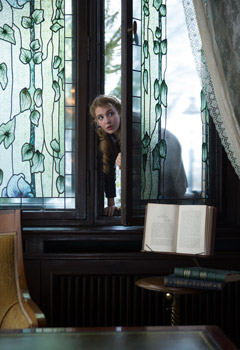 A New Family
A New FamilyWith Sophie Nélisse set to portray Liesel, the filmmakers moved quickly to lock in their long-discussed choices, Geoffrey Rush and Emily Watson, to portray Liesel's new parents, Hans and Rosa Hubermann. Brian Percival notes that from the start, the consummate actors were in sync with his vision for the film. 'I wanted to play everything very naturally, and that's a style with which Geoffrey Rush and Emily Watson are very comfortable. Their work really transcends acting. They own the characters, they are the characters, and they all fit together beautifully. In working with Geoffrey Rush and Emily Watson, Sophie Nelisse has probably had the best master class in the world because she absorbed the way they approach scenes and think about their roles, and you could see that rubbing off on her."
From The King's Speech to the Pirates of the Caribbean films, the Oscar®-winning Geoffrey Rush has delivered a series of towering performances. With The Book Thief, he became Hans Hubermann. Geoffrey Rush credits the book and script with providing the initial critical path to Hans. 'I think the book is one of the great classics of contemporary literature, and though I knew I wanted to play Hans after reading the script, the novel inevitably became a bible because it offers so much internal observation of the character, and his rhythm, pace and inspiration." (Markus Zusak notes that Geoffrey Rush 'knew Hans so well, that at one point I thought he knew it better than I did – and that was a real thrill.")
Geoffrey Rush credits Brian Percival with providing critical context to the dark times in which these people endeavour to not only survive but maintain all that they cherish. 'Brian Percival is an extraordinarily sensitive man to events and issues in the screenplay that are disturbing and overwhelming. We're looking at probably one of the worst chapters in history, not just in Germany but the whole nature of the Second World War, and he brings an extraordinary daily reality to what was going on."
A house painter by trade, Hans' constant companion is an old accordion that emits warm, wheezy chords of music. He appears to be an uncomplicated man, but is as complex as any Geoffrey Rush has essayed. 'I think Hans' greatest gift is that he has a very acute emotional intelligence," which leads to an almost immediate and emotional rapport with Liesel, he explains. 'Hans can read in Liesel that she's been through very difficult times and he tries to find ways to draw her out, sometimes by playing the accordion which he loves."
More significantly, Hans quickly recognises her desire to learn to read. He encourages this pursuit, which becomes a moving element of their deepening father-daughter relationship. He patiently reads with Liesel the book she had stolen at her brother's funeral, The Grave Digger's Handbook, and from there works with Liesel to create a unique dictionary made up of columns of words and definitions painted on a basement wall.
Says Geoffrey Rush: 'Hans responds to the glimmer of energy Liesel has buried inside her and helps bring it to the surface. She starts to love language and words for the hidden powers they have, instead of the poisonous oratory and rhetoric surrounding them. Liesel finds an escape – a spiritual retreat in the magic of language. Once you understand the potential of language you can understand the potential of ideas outside of your own experience. I hope The Book Thief will have a similar effect on an audience. To me, it's about discovering the value of empathy."
Geoffrey Rush and Sophie Nelisse developed an instant rapport that, says Geoffrey Rush, fed into the dynamic between their on-screen characters. 'The great pleasure of doing this has been working with Sophie Nelisse, who's such a playful actress," he says. 'She's extraordinary to be around, and I loved that in between takes of very dramatic scenes she would be playful. But when it came to playing the emotional scenes, I was flabbergasted by how focused and how emotionally true she was."
Hans' wife, Rosa, is an equally rich, surprising and complex character that combines a harsh exterior with well-hidden inner warmth. Rosa regularly calls her husband, 'saukerl!" – German for filthy pig. 'In some ways, Rosa is caustic and seemingly unforgiving," says Emily Watson. 'She's harsh with Hans and Liesel, not the sort of person you'd expect to become a foster parent."
Over time and with her growing love for Liesel, Rosa is revealed to be a caring mother to her and a loving, if impatient wife to Hans. Says Emily Watson: 'Rosa has an inner goodness that almost always has her doing the right thing." Watson gave considerable thought to Rosa's backstory, particularly her marriage. 'I think Rosa was young and beautiful once, and probably more soft-spoken, but the times have changed her. She seems like she's angry and disappointed about pretty much everything in her life including her husband, with whom she's at best dismissive, at times. But their love for each other is still evident."
Having previously worked with Geoffrey Rush in The Life and Death of Peter Sellers, Emily Watson enjoyed their second collaboration: 'Geoffrey Rush's onscreen outpouring of tenderness towards Liesel is so very lovely," she notes.
For Brian Percival, working with Emily Watson seemed destined to happen, because her film debut in the acclaimed Breaking the Waves was so moving and powerful that it led him to realise he wanted to direct films. Emily Watson was busy at home with her children when she received the script for The Book Thief. 'I sat down to read it that night, and I wept through it," she remembers. 'It was the best script I've read in years." She was at once drawn to the idea that reading opens up a world of instant riches: 'It's a love letter to the power of story and the transcendence of story and storytelling and how it saves lives. That's an amazing thing."
Another new member of the Hubermann household is Max, a Jewish refugee who arrives there, terribly ill and seeking shelter from the Nazis' relentless pursuit. Hans, fulfilling a promise he had made years earlier to Max's father, to whom Hans owed his life, takes in the young man.
Liesel's fascination with her new housemate is heightened because they're kindred spirits - both are displaced and without their families – and they form a powerful bond. Their mutual love of books becomes as critical to their survival as food and shelter. Max teaches Liesel far more than just improving her reading skills; he teaches her how to use words, and thus gives her eyes to the world around her. From his new home in the Hubermann's dark and sometimes freezing basement, Max opens up a new world for Liesel. She becomes his messenger to what's happening in the world outside. Even her descriptions of everyday things, like the color of the sky and types of cloud formations, become poetic as Liesel learns from Max the descriptive power of language.
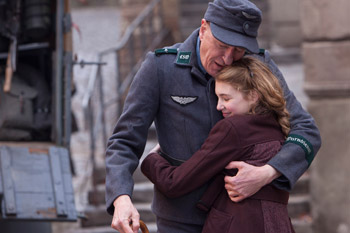 Ben Schnetzer, who portrays Max, was in his final year at the Guildhall School of Music and Drama in London when he was cast in the role and feels blessed to be part of what he calls 'the type of project that makes you want to be an actor." To portray the starving refugee, Ben Schnetzer lost 37 pounds in seven weeks – and his first meal back home, following the shoot's completion was a large cheese pizza and two sodas.
Ben Schnetzer, who portrays Max, was in his final year at the Guildhall School of Music and Drama in London when he was cast in the role and feels blessed to be part of what he calls 'the type of project that makes you want to be an actor." To portray the starving refugee, Ben Schnetzer lost 37 pounds in seven weeks – and his first meal back home, following the shoot's completion was a large cheese pizza and two sodas. 'Max becomes almost a mentor to Liesel and he finds redemption and strength in the opportunity to open up a world to her through literature and words," Ben Schnetzer continues. 'Their symbiosis gets Max through each day and into the next."
Another transformative figure in Liesel's journey is her young neighbour and schoolmate Rudy Steiner. Liesel and Rudy become fast friends and do everything together, including stealing ('borrowing," Liesel insists) books. In fact, it is Rudy who nicknames Liesel, 'The Book Thief."
While Liesel's passion is books, Rudy dreams of being a champion racer. His idol is African-American Olympic hero Jesse Owens, who achieved international fame by winning four gold medals in the 1936 Olympics in Berlin. Rudy even goes so far as to cover himself with black paint (which he stole from Hans' work cart), in honour of his idol – a choice that's none too popular with a town being consumed with the doctrine of Aryan supremacy.
Young German actor Nico Liersch describes Rudy as, 'always happy, nice to everyone, and never sad," and that description fits also the actor who plays him. Sophie Nelisse and Nico Liersch became close friends during production – though Sophie Nelisse would squeal with laughter through almost every take while shooting scenes where Rudy tries to kiss Liesel – much to the crew's amusement.
The All-Seeing Narrator
Another central character is unseen - The Book Thief's omniscient narrator, Death, whose caustic musings about the human condition and his role in it are unpredictable, blunt, witty and unexpectedly relatable. Speaking with a calm and meted authority, Death's observations are all the more revealing, given that the world of the 1930s and -40s Germany was tailor-made for him.
Markus Zusak made Death his narrator because, the author notes, 'it just made sense. Everyone says Death and War are like best friends, and so who better to be telling a story set during wartime than Death?"
Death rarely takes much of an interest in the lives he's about to erase. Liesel is a notable exception. As Death tells us: 'I make it a policy to avoid the living…well, except sometimes I can't help myself…I get interested…Liesel Meminger caught me…and I cared."
Brian Percival wrestled with how to depict the character before and during production. A key idea came from the novel, as he explains: 'One of the strongest lines from the book that stayed with me went was something like, -If you want to know what Death looks like, look in the mirror' – although Markus Zusak put it far more eloquently than that! That seemed to me to be the point; Death is in all of us, there is no escape. However, the most overwhelming feeling after reading the novel is that Death is not necessarily something we should be frightened of. That's not to say we welcome it, but that it does not mean it has to be a terrible, horrific experience."
A casting decision for the voice of Death proved elusive, even as principal photography was well underway. 'We had many ideas but no one definitive," says Brian Percival. 'We just knew Death had to be warm, witty, wry and have the welcoming but knowledgeable nature of someone we would trust and be drawn to."
After a long search, Death was given a voice: Roger Allam, an English actor known primarily for his stage work. 'Roger Allam's warm, velvety soft voice was perfect," Brian Percival explains. I have always admired his work, so we tested with him and the response was very positive. I was delighted."
Brian Percival discussed the character with Roger Allam but notes that their vision for the voice solidified 'once I had shown Roger Allam the (almost) finished film. He got what I was after immediately. All of the characteristics required became apparent just from the viewing."
The Book Thief's supporting cast includes the noted German actors Barbara Auer as Ilsa, the mayor's wife, who encourages Liesel to read from her extensive home library; Rainer Bock as the Burgermeister (mayor), whose embrace of Nazism hides a dark secret; Oliver Stokowski as Rudy's father, Alex Steiner; Matthias Matschke as Wolfgang, a Nazi Party member and acquaintance of Hans'; and Heike Makatsch as Liesel's birth mother.
Maestro
A critical element in establishing and reinforcing The Book Thief's themes and characters is the score. Long before cameras started rolling, the filmmakers set their sights on a composer whose majestic achievements in film scoring are unparalleled: John Williams.
Throughout a career spanning six decades, John Williams has become one of America's most accomplished and successful composers for film and for the concert stage, and he remains one of our nation's most distinguished and contributive musical voices.
He has composed the music and served as music director for more than 100 films, including all six Star Wars films, the first three Harry Potter films, Superman, JFK, Born on the Fourth of July and Home Alone. John Williams' 40-year artistic partnership with director Steven Spielberg has included many of Hollywood's most acclaimed and successful films, including Schindler's List, E.T. The Extra-Terrestrial, Jaws, Jurassic Park, Close Encounters of the Third Kind, the Indiana Jones films, Saving Private Ryan and Lincoln.
Like so many film and music enthusiasts around the world, Brian Percival was a huge admirer of John Williams' work, and feels extraordinarily fortunate to have the iconic composer weave his magic through The Book Thief. 'I was amazed and thrilled when John agreed to compose the score," he says. 'I grew up watching Steven Spielberg's films scored by John Wiliams. They had a big influence and attraction to me. I spent hours sitting in cinemas, enjoying the ride and loving every minute. The thought that I am now actually working with this great man is still quite beyond belief. He is a legend, a genius and a true gentleman. I am in awe."
For several years, John Williams has chosen to compose film scores exclusively for Mr. Spielberg. The Book Thief is his first film score for another filmmaker since 2004's Harry Potter and the Prisoner of Azkaban. The legendary artist accepted the new assignment because, 'I was captivated by The Book Thief. First, by the book itself, with its originality and imagination, and then by the film, done with such tenderness and simple humanity by director Brian Percival. When Mr. Brian Percival invited me to compose the music for his project, I was delighted at being offered the privilege of creating a score that might be worthy of the notions and ideas contained within this illuminating film."
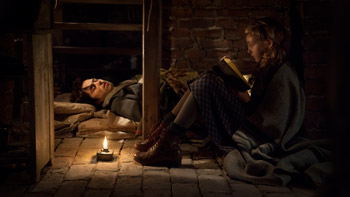 'John Williams saw this film as a departure from some of the work he has done in the past, including the huge, fanfare scores for which he is best known," adds Brian Percival. 'His score for The Book Thief is a very emotional one. I think that challenge appealed to him."
'John Williams saw this film as a departure from some of the work he has done in the past, including the huge, fanfare scores for which he is best known," adds Brian Percival. 'His score for The Book Thief is a very emotional one. I think that challenge appealed to him." John Williams and Brian Percival agreed that much of the film's score would eschew big orchestrations, opting instead for music characterised by what Brian Percival calls 'a simple, honest beauty."
'The images in the film reflect the innocence and humble nature of the story we are telling," the director continues. 'It would be wrong to create a grand score that would overshadow the simple lives of the ordinary people of Himmel Street, and John Williams understood this. He has written a score that is beautiful and perfectly suited to this approach, and it moved me to tears."
Himmel Street
Shooting on The Book Thief began at Studio Babelsberg, in Berlin, Germany. There, the unit used sound stages, where production designer Simon Elliott (The Iron Lady) crafted the Hubermann's House on the fictional Himmel Street. ('Himmel is the German word for 'heaven" or 'sky.") When not on the stages, the production filmed on the studio backlot, where Simon Elliott built the exterior of the house, one of several in the neighbourhood. Simon Elliott also revamped Babelsberg's backlot into the story's Munich Street.
Simon Elliott credits Brian Percival and the design team for inspiration, as well as Markus Zakus' vivid prose. 'I'd read the book and absolutely loved it," says Simon Elliott. 'I knew the potential for designs was going to be enormous. Markus Zakus writes very visually. He references colours all the time, and his writing has many descriptions that were very helpful."
The filmmakers scouted the breadth of the country in search of Himmel Street. The importance of getting it right was central to Simon Elliott's vision. 'It is such a popular book that everyone has their interpretation of how Himmel Street should look. Germany is a very progressive country and is developing very fast so many of the historic smaller rural areas have been modernised. We found little bits of Himmel Street all over the place but we just didn't want to compromise. So we built it."
Simon Elliott explains that understanding the demographics of the characters living on the fictional street was key to creating an authentic space. 'They're not wealthy, nor are they out-and-out poor; they are working people so the buildings are a little run down, and not at all grand."
Simon Elliott and his team spent ten weeks building a large hill at one end of Himmel Street during some of the coldest weather Berlin had seen in years. The control afforded by building the street from scratch allowed Simon Elliott to create the shocking aftermath of a bombing raid, for which they added 1,000 tons of rubble.
Inside 33 Himmel Street, Elliott and director of photography Florian Ballhaus, ASC (Red, The Devil Wears Prada) created a warm and inviting space. 'Historical films are so often drained of colour, but there is so much colour in the book I thought it was important to maintain that, in order to give the film depth and richness. There is great heart to The Book Thief. It's a very human story and although it takes place against the backdrop of a difficult period, it's about loving relationships. By giving a richness of colour to the home and to the film overall, we reflect that warmth and the good that can come from a terrible situation."
The basement set, where so much of the story's emotional moments unfold, presented formidable design challenges. 'We knew the ceiling had to be low and that the walls would be covered in Liesel's handwriting and dictionary. To give the space some depth we put the staircase in the middle of the room, enabling the camera to move more freely. The presence of items such as stored vegetables, pickling jars, and Hans' paint cans, brushes and tools connects the space to the rest of the house."
Midway through the shoot, the production relocated to Görlitz, the easternmost town in Germany, located on the Lusatian Neisse River in the Bundesland of Saxony. It was here that production captured one of the film's key set pieces, in which the German Student Association of Nazi Germany ceremonially burn books by authors whose writings were viewed as subversive or whose ideologies undermined the National Socialist administration.
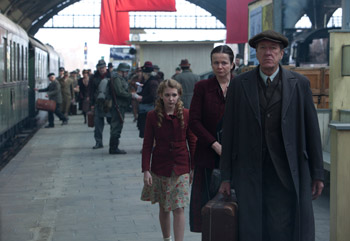 The emotionally charged, large-scale sequence finds Liesel bearing witness to the destruction of thousands of books as the townspeople cheer. In the aftermath of this shocking display, Liesel, 'the book thief," rescues a single volume, its pages still smoking with heat.
The emotionally charged, large-scale sequence finds Liesel bearing witness to the destruction of thousands of books as the townspeople cheer. In the aftermath of this shocking display, Liesel, 'the book thief," rescues a single volume, its pages still smoking with heat. Over three nights, with temperatures plummeting to minus-two degrees Fahrenheit, cast and crew, and 450 extras, wrapped in blankets when the cameras weren't rolling, worked through the night to capture a dark time in global history with chilling authenticity.
The square was dressed with huge swathes of swastikas – unsettling emblems in today's Germany. In fact strict laws in the country prohibit the display of Nazi paraphernalia in public places, so the filmmakers had to obtain special permission to dress the town square. The production also shot at Villa Herz, a 120-year-old historical house in Wannsee, which doubled for the Burgermeister's Mansion, from which Liesel borrows books.
After production wrapped and Brian Percival and his post-production teams began their critical work, Makus Zusak was asked about his hopes for what audiences take away from the film based upon his book. Again, he says, it all comes down to the power of storytelling, be it in literature or film – and most importantly, the ability within all of us to persevere and even triumph in the face of the most formidable obstacles.
'I think people will find The Book Thief moving because the characters somehow find beauty and selflessness and do amazing things despite incredibly trying conditions."
The Book Thief
Release Date: January 9th, 2014
MORE
- Mission: Impossible Fallout
- Glenn Close The Wife
- Allison Chhorn Stanley's Mouth Interview
- Benicio Del Toro Sicario: Day of the Soldado
- Dame Judi Dench Tea With The Dames
- Sandra Bullock Ocean's 8
- Chris Pratt Jurassic World: Fallen Kingdom
- Claudia Sangiorgi Dalimore and Michelle Grace...
- Rachel McAdams Disobedience Interview
- Sebastián Lelio and Alessandro Nivola...
- Perri Cummings Trench Interview



